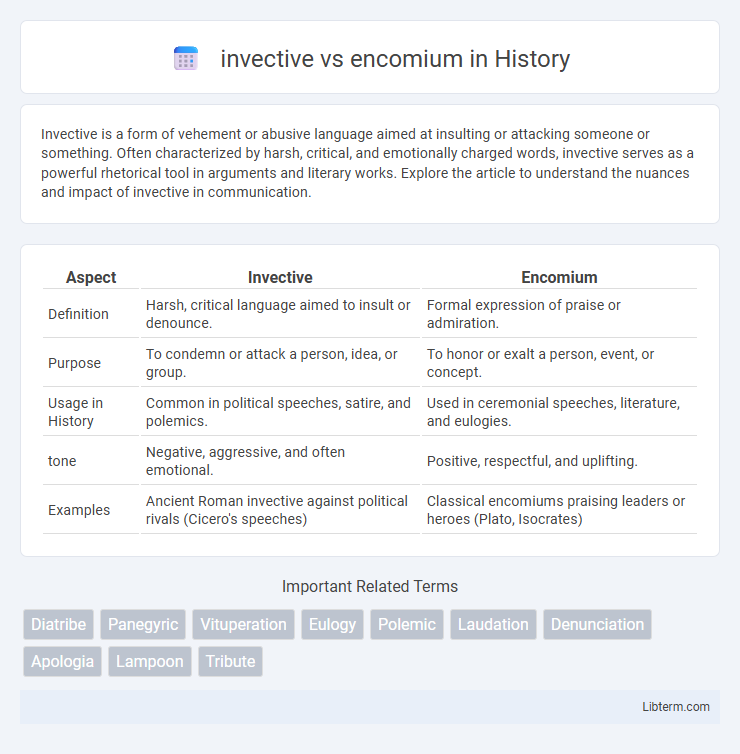Invective is a form of vehement or abusive language aimed at insulting or attacking someone or something. Often characterized by harsh, critical, and emotionally charged words, invective serves as a powerful rhetorical tool in arguments and literary works. Explore the article to understand the nuances and impact of invective in communication.
Table of Comparison
| Aspect | Invective | Encomium |
|---|---|---|
| Definition | Harsh, critical language aimed to insult or denounce. | Formal expression of praise or admiration. |
| Purpose | To condemn or attack a person, idea, or group. | To honor or exalt a person, event, or concept. |
| Usage in History | Common in political speeches, satire, and polemics. | Used in ceremonial speeches, literature, and eulogies. |
| tone | Negative, aggressive, and often emotional. | Positive, respectful, and uplifting. |
| Examples | Ancient Roman invective against political rivals (Cicero's speeches) | Classical encomiums praising leaders or heroes (Plato, Isocrates) |
Understanding Invective and Encomium
Invective is a rhetorical device characterized by harsh, abusive language aimed at criticizing or attacking a person, group, or idea, often used in political speeches and satirical writings for persuasive impact. Encomium, in contrast, is a formal expression of high praise and admiration, commonly found in eulogies, award ceremonies, and commemorative speeches, emphasizing positive traits and achievements. Understanding invective and encomium involves recognizing their opposing functions in rhetoric--invective as a tool of condemnation and encomium as a celebration of excellence.
Defining Invective: Origins and Usage
Invective, originating from the Latin word "invectivus," refers to language that is harshly critical or abusive, often used to denounce or insult individuals or ideas. Historically rooted in classical rhetoric, invective has been employed as a powerful tool in political speeches and literary works to condemn opponents vividly. Its usage remains relevant in modern discourse for emphasizing strong disapproval or moral condemnation.
Encomium Explained: History and Purpose
Encomium is a formal expression of high praise, rooted in ancient Greek rhetoric where it functioned to honor individuals, events, or virtues through eloquent speech or writing. Historically, encomiums served to reinforce social values and celebrate exemplary qualities, often delivered at public ceremonies or in literary works to immortalize the subjects' achievements. The purpose of encomium is to cultivate admiration and inspire emulation by emphasizing positive attributes with vivid, persuasive language.
Key Differences Between Invective and Encomium
Invective is a form of speech or writing that expresses strong criticism or condemnation, often using harsh and abusive language to attack a person or idea. Encomium, in contrast, is a formal expression of praise, highlighting someone's virtues, achievements, or qualities with positive and laudatory language. The key differences lie in intent and tone: invective aims to defame or insult, while encomium seeks to honor or celebrate.
The Role of Tone and Intent in Rhetoric
Invective employs a harsh, aggressive tone designed to criticize or demean opponents, aiming to provoke emotional responses and undermine credibility, while encomium uses a positive, celebratory tone to praise and elevate subjects, fostering admiration and approval. The intent behind invective is often to attack and discredit, contrasting with encomium's goal of honoring and affirming virtues or achievements. Effective rhetoric strategically uses tone and intent to influence audience perception, shaping arguments through emotional appeal and moral positioning.
Historical Examples of Invective in Literature
Classical invective features prominently in works like Cicero's speeches, where he harshly attacked political opponents with biting rhetoric to sway public opinion in ancient Rome. In medieval literature, Geoffrey Chaucer's "The Canterbury Tales" uses invective humorously to criticize societal vices and personal flaws. Shakespeare's plays often deploy invective through characters like Iago in "Othello," whose scathing accusations and insults serve to manipulate and reveal darker human motives.
Notable Encomiums Throughout History
Notable encomiums throughout history include Cicero's "Pro Archia," praising the poet Archias, and Lincoln's Gettysburg Address, which honors fallen soldiers with noble and uplifting language. Encomiums often highlight virtues and accomplishments, contrasting sharply with invective's use of harsh criticism and denunciation. These laudatory speeches and writings underscore the power of praise in shaping public memory and moral values.
Effects of Invective vs. Encomium on Audiences
Invective provokes strong emotional reactions such as anger or defensiveness by directly attacking a person or idea, creating a confrontational atmosphere that can polarize audiences. Encomium, on the other hand, fosters admiration and positive feelings by highlighting virtues and achievements, encouraging unity and respect among listeners. These contrasting rhetorical strategies shape audience engagement and influence perception, with invective triggering critical scrutiny and encomium promoting endorsement.
Modern Applications in Media and Public Discourse
Invective and encomium persist as powerful rhetorical tools in modern media and public discourse, shaping audience perception through starkly contrasting tones. Invective employs sharp, aggressive language to criticize and undermine opponents, frequently seen in political debates, social media conflicts, and editorial commentary. Encomium, featuring praise and commendation, is prominent in award speeches, influencer endorsements, and brand storytelling, fostering positive engagement and reinforcing authority.
Choosing Invective or Encomium: Considerations for Writers
Writers choosing between invective and encomium must consider their rhetorical goals, audience, and the desired emotional impact, as invective employs harsh criticism and sarcasm while encomium uses praise and admiration. The context of the message plays a crucial role; invective is effective for provoking thought or highlighting flaws, whereas encomium strengthens relationships or celebrates achievements. Selecting the appropriate tone and style ensures the communication resonates authentically and achieves the intended persuasive effect.
invective Infographic

 libterm.com
libterm.com